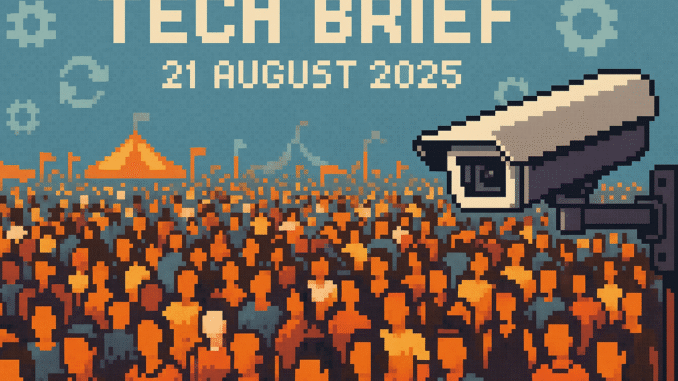
Tech Brief 21 August 2025 lands with stories that don’t shy away from the uncomfortable questions, from live facial recognition at Notting Hill Carnival to the latest round of forced updates that make your phone feel a little less like your own. If you’re the sort who checks the privacy settings twice or just misses the days before every device needed an “upgrade,” you’ll find plenty to discuss.
Missed yesterday’s Tech Brief? Catch up here before diving in.
Metropolitan Police Defend Live Facial Recognition at Notting Hill Carnival
“Nothing to worry about. It’s just a camera.” For anyone who grew up wary of CCTV domes over the A23, the leap to cloud-based surveillance feels like crossing a line in broad daylight. We all remember when cameras were just hardware, not algorithms. The Met’s use of live facial recognition at Notting Hill Carnival has triggered another round of privacy protests, with civil liberties groups pointing to well-documented algorithmic bias. Police Commissioner Mark Rowley calls it a safety measure, but critics say it chips away at public trust.
Today’s software can pick you out of a crowd before you’ve even found the jerk chicken stall. Usenet threads in the early nineties warned about this sort of future, back when you could still believe the lens might be faulty or unplugged. The question now is whether the party will feel any safer, or just more observed.
Forced Software Updates Fuel User Fatigue and Frustration
Control slipping from your hands? Patrick Lum’s recent experience is painfully familiar. An overnight update left his phone’s music controls unusable while using maps, all in the name of “improvement.” Forced software updates, sold as progress, now break things that used to work. Is anyone actually in favour of these?
There’s a proper déjà vu here. Back in the floppy disk era, at least you got a printed warning before your game stopped working. Now, silent background updates turn your phone into a test device for features you never asked for. The issue is bigger than inconvenience. It’s about trust and the growing sense that “your” device is no longer truly yours.
All this patching, and still nothing beats an “Are you sure?” prompt.
Met Police-Fujitsu Link Questioned Amid Horizon Scandal Probe
Do you trust the people tasked with investigating tech scandals, especially when their partners helped build the broken systems? Freedom of information requests have exposed a sub-contract between the Metropolitan Police and Fujitsu, the same firm behind the Post Office Horizon disaster.
There’s no shadowy conspiracy, just a depressingly familiar British conflict of interest. The Met is now leading the probe into one of the country’s worst miscarriages of justice, but campaigners question how objective the investigation can be if police data still flows through Fujitsu’s infrastructure. For anyone who lived through BT’s privatisation or the infamous civil service computer fiascos, the sting is in how little seems to have changed.
Earlier in today’s briefing, we looked at trust and persistence in technology. Now, the institutions themselves face their own very modern stress test.
Britain’s Chip Strategy Misses Key Opportunities in AI Acceleration
Who is actually setting the pace for British tech: policy-makers or engineers? A new government report highlights gaps in the UK’s AI and chip strategy, especially the lack of focus on hardware designed for machine learning at scale. There’s a call for a pivot toward AI-specific processors, not just broad vision statements.
The historical context is hard to ignore. British engineers once led with home-grown systems like Acorn and ARM. That confidence feels harder to spot now, as global chip leaders look elsewhere. The current approach seems to rely on quick fixes and statements rather than getting more silicon into sockets. Without proper support for semiconductor innovation, the UK risks falling further behind.
Can Britain still claim a stake in building the future, or just buying it?
From the Wayback Machine
On This Day: 1992 – Mobile Networks Launch Britain’s First SMS Text Service
Cellnet and Vodafone’s early SMS services quietly started a texting revolution in late 1992 and early 1993. The first SMS message, sent in December 1992 by Vodafone engineer Neil Papworth, simply read “Merry Christmas.” Early SMS was limited: you could send texts from computers to phones before phones could reply to each other, nudging users to adapt fast. The roots of today’s emoji and iMessage culture are there in those clipped texts and blinking “Inbox Full” alerts. While critics doubted anyone would ever have enough to say in 160 characters, user demand quickly proved them wrong. While BT later entered mobile through BT Cellnet (which became O2), the pioneering SMS work belonged to Vodafone and Cellnet, working with international GSM standards developed with British participation. For many, it was a first taste of digital independence.
What This Means
Tech Brief 21 August 2025 is all about trust. Who controls the tools we depend on, and who decides when they change? From street cameras to silent updates, the balance of power feels less certain. Maybe that’s why we keep poking at the past for answers.
Keep poking, fixing, and questioning what’s running on your kit. The digital present is still up for grabs.
Missed yesterday’s Tech Brief? Catch up here

Leave a Reply